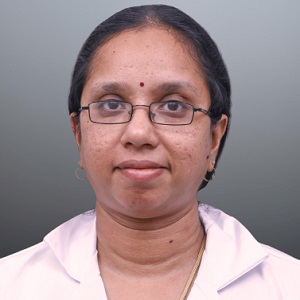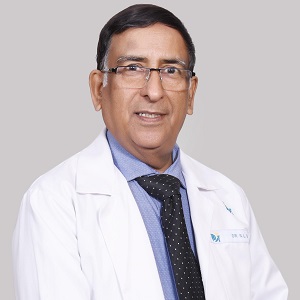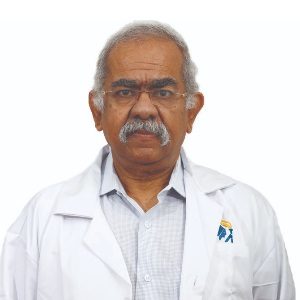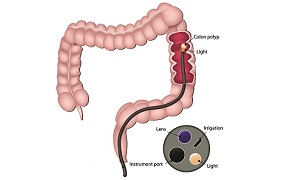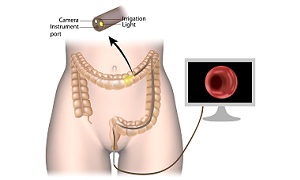Best Doctors in India for Rectal Cancer Treatment
- Top Gastroenterologist & Hepatologist | Apollo Hospital, New Delhi, India
- 30+ Years Experience
- Indraprastha Apollo Hospital, New Delhi
Profile Highlights:
- Dr. Amitabha Dutta is a highly esteemed Gastroenterology and GI Medicine Specialist with over 30 years of distinguished experience in his field.
- He practices at Apollo Hospitals Indraprastha in New Delhi, where he offers expert care in diagnosing and treating a wide range of gastrointestinal conditions.
- He further advanced his qualifications with prestigious fellowships, earning FRCP from The Royal College of Physicians of Ireland in 2014 and FRCP from the Royal College of Physicians, London in 2015
- Gastroenterologist, Chennai, India
- Over 13 years’ experience
- Apollo Clinic Valasaravakkam; Chennai
Profile Highlights:
- Dr. M Tarakeshwari is a well-known gastroenterologist who provides various services to her patients and is an expert in cytokines in IBS, treating Hepatitis B in pregnancy as well as renal failure in Cirrhosis.
- Some of the services provided by the Dr. M Tarakeshwari are: Acidity Treatment, Gallbladder (Biliary) Stone Treatment, Bladder Cancer Surgery, Inflammatory Bowel Disease (IBD) Treatment Ulcerative Colitis Treatment, etc
- Top Medical Gastroenterologist | Apollo Hospital, New Delhi, India
- 54+ Years Experience
- Indraprastha Apollo Hospital, New Delhi
Profile Highlights:
- Dr. Sohan Lal Broor is a Gastroenterologist and has an experience of 54 years in this field. Dr. Broor practices at Indraprastha Apollo Hospitals in New Delhi.
- He completed MBBS from Panjab University in 1967, MD – Medicine from PGIMER, Chandigarh in 1972, and DM – Gastroenterology from PGIMER, Chandigarh in 1974.
- Dr. Sohan Lal Broor is a member of the 2-Year Fellowship in Gastroenterology at Medical College Of Wisconsin, Milwaukee, USA.
- Some of the services provided by Dr. Broor are Irritable Bowel Syndrome ( IBS ) Treatment, Peptic/ Gastric Ulcer Treatment, Inflammatory Bowel Disease (IBD) Treatment, Hemorrhoids Treatment, and Gastritis Treatment.
- Gastroenterologist and GI Medicine Specialist, Chennai, India
- Over 23 years’ experience
- Apollo Hospitals Greams Road
Profile Highlights:
- Dr. Revathy Shanmugam is an experienced Gastroenterologist in Tamil Nadu, having an experience of 23 years in the management of GI disorders, Training & Teaching.
- She is highly skilled in the services like Liver Disease Treatment and Inflammatory Bowel Disease (IBD) Treatment.
- She has published various scholarly works in many National & International Publications of Medical Gastroenterology.
- Gastroenterologist and GI Medicine Specialist, Chennai, India
- Over 32 years’ experience
- Apollo Hospitals Greams Road
Profile Highlights:
- Dr. Hariharan Muthuswamy is a veteran Gastroenterologist and Hepatologist in India with over 32 years of experience.
- He is currently a Senior Consultant in Gastroenterology at Apollo Hospital, Chennai.
- Dr. Muthuswamy is proficient in treating patients with Non-Surgical Piles, Liver Disease, Hepatitis E, Hepatitis A and Hepatitis B, Hemorrhoids, Acid Reflux (Heartburn), Amoebiasis, Chronic Pancreatitis, Peptic Ulcers (Sores in the Stomach Lining), etc.
- Gastroenterologist and GI Medicine Specialist, Chennai, India
- Over 32 years’ experience
- Apollo Hospitals Greams Road
Profile Highlights:
- Dr. Mohan A T is a veteran GI medicine specialist in India with an experience of 32 years.
- Dr. Mohan, an alumnus of Madras University, is the Co-Ordinator of the Indian Society of Enteral and Parenteral Nutrition.
- He is an expert in treating Gastritis, acidity, Ulcerative Colitis, and many other Intestinal and bowel-related Treatments. In addition to these, he offers Colonoscopy, Gastroscopy, and Endoscopy.
- Gastroenterologist and GI Medicine Specialist, Chennai, India
- Over 15 years’ experience
- Apollo Hospitals Greams Road
Profile Highlights:
- Dr. Piramanayagam P is one of the young Gastroenterologists in India, having an experience of 15 years in the field.
- The doctor offer services like Gall Bladder (Biliary) Stone treatment, IBS treatment, Acidity Treatment, Endoscopy, and stomach and intestine dysfunction.
- He published many review articles and books under his name.
- Gastroenterologist and GI Medicine Specialist, Chennai, India
- Over 39 years’ experience
- Apollo Hospitals Greams Road
Profile Highlights:
- Dr. Sarojini Parameswaran is one of the renowned Gastroenterologist with an overall experience of 39 years.
- Dr. Parameswaran is brilliant and quick with diagnosis. She has 22 years of specialist experience.
- Gastroenterologist and GI Medicine Specialist, Chennai, India
- Over 24 years’ experience
- Apollo Hospitals Greams Road
Profile Highlights:
- Dr. Seshadri Venkatesh P is a well-known Gastroenterologist in India, having 24 years of experience in Stomach and Intestine disorders.
- Dr. Seshadri acquired proficiency in managing Bladder Cancer surgery, hemorrhoids, Irritable Bowel Syndrome (IBS) Treatment, etc.
- He holds membership in Tamil Nadu Medical Council.
- Gastroenterologist and GI Medicine Specialist, Chennai, India
- Over 40 years’ experience
- Apollo Hospitals Greams Road
Profile Highlights:
- Dr. Usha Srinivas is a Gastroenterologist in India with an experience of 40+ years in GI in medicine and academics.
- Patients visit her for consultation and treatment of abdominal pain, Gall Bladder (Biliary) Stone, Gastroenteritis, Jaundice, Colonoscopy, Steatosis, Constipation Treatment, Hepatitis C Treatment, Hepatitis E Treatment, Hemorrhoids Treatment, Piles Treatment (Non-Surgical), Gastritis Treatment, Ulcerative Colitis Treatment, and others.
Best Hospitals in India for Rectal Cancer Treatment
- City: New Delhi, India
Hospital Highlights:
- Equipped with 650 beds, BLK-Max Super Speciality Hospital is the largest stand-alone private sector hospital in Delhi.
- With over 1500 healthcare providers and 150 globally renowned super specialists, the hospital is one of Asia’s largest BMT Centres. The hospital is known for having some of the best cancer doctors in the country.
- The hospital is NABH and NABL accredited and was inaugurated by the first Prime Minister of India. Pt. Jawahar Lal Nehru.
- City: Hyderabad, India
Hospital Highlights:
- Located in the vibrant city of Hyderabad, Apollo Health City is a world-renowned medical facility that provides outstanding care and treatment to patients coming from different parts of the world.
- Founded in 1988, this 550-bed multispecialty hospital with 50 specialties and 12 Centres of Excellence continues to deliver outstanding outcomes for patients with the simplest to the most complicated medical conditions.
- Backed by the latest medical equipment and a dedicated team of professionals, the hospital provides comprehensive treatment across various specialties including, cardiology, critical care, neurosciences, cancer, orthopedics, gynecology, ENT, transplants, gastroenterology, etc.
- Apollo Health City is a cutting-edge healthcare facility that combines various facilities under one roof. These may include state-of-the-art physical medicine, rehabilitation, and wellness services with education, research, telemedicine, innovative medical devices, disease management programmes, and medical talents.
- The hospital is known for offering top-notch cancer treatment accompanied by cutting-edge facilities and technology.
- The hospital also offers a broad spectrum of cosmetic procedures that improve not just appearance but also comfort.
- In 2011, Apollo Health City was the recipient of the Asian Hospital Management Award (AHMA).
- In 2013, the Government of India recognized Apollo Health City as the top medical tourism destination in the country.
- City: Mumbai, India
Hospital Highlights:
- Kokilaben Dhirubhai Ambani Hospital, Named after the wife of Indian industrialist Dhirubhai Ambani, the founder of Reliance Industries, this is one of the top hospitals in Mumbai. This 750-bed multi-specialty hospital became operational in 2009. Known as one of India’s most advanced tertiary care facilities, the hospital is designed to raise India’s global standing as a healthcare hub, with an emphasis on excellence in clinical services.
- Kokilaben Dhirubhai Ambani Hospital uses Protocol and Care Pathway based treatment models to ensure the best outcomes for patients.
- The hospital represents a confluence of top-notch talent, cutting-edge technology, state-of-the-art infrastructure, and, most importantly commitment.
- The hospital also holds the accreditation of the NABH, NABL, CAP, and JCI.
- The hospital has been recognized as the No. 1 Multispecialty Hospital in Mumbai and the West Zone for the fifth year in a row in 2020 by The Week.
- City: Chennai, India
Hospital Highlights:
- Apollo Cancer Centre in Teynampet, Chennai is one of the best super speciality hospitals in India. It is the country’s first ISO-certified healthcare facility.
- Additionally, it is the first hospital in Chennai and the first oncology hospital in India to receive NABH accreditation.
- The hospital provides advanced tertiary care in oncology, orthopedics, neurology and neurosurgery, head and neck surgery, and reconstructive and plastic surgery.
- Additionally, it offers specialized healthcare of international standards with results comparable to those of the best hospitals in the world.
- It is outfitted with 300 beds, the newest and greatest technology, a large pool of highly qualified specialists, and a committed team of medical and paramedical professionals.
- It is one of the first few medical facilities in India to offer comprehensive cancer care. A team of skilled medical, surgical, and radiation oncologists makes up the Tumour Board, which is a component of the complete treatment planning system. After reviewing reported cases, the Board determines in concert with diagnostic specialists what course of action is best for each individual patient. The panel is further supported by dieticians, medical counselors, speech therapists, and other pertinent specialists.
- The hospital launched the first ExcelsiusGPS® Spine Robot in South India and has completed over 50 surgeries till date.
- It is also one of the few cancer hospitals in India to offer Cyber Knife therapy. Till now it has completed 1320 Cyber Knife therapies.
- The institution is also one of the few in India with the capacity to do transplants and find a prospective unrelated donor. The hospital has performed over 1000 BMTs till now.
- Furthermore, it has an exceptional milestone of performing exultant Micro vascular free tissue transfer and Aesthetic surgeries on more than 1000 patients with success.
- City: Chennai, India
Hospital Highlights:
- Apollo Hospitals, Chennai, is one of the best hospitals for heart care in India. Over the years, Apollo has expanded all over India, as a healthcare chain.
- India’s first ‘Only Pancreas’ transplant was performed in Apollo Hospital. The hospital is known for successfully performing Asia’s first en-bloc combined heart and liver transplant, and over the years, it has attained a remarkable achievement in the global healthcare space. Around 3-4 organ transplants are performed in the hospital per day.
- Equipped with over 500 beds, this hospital in Chennai was established in 1983 and since then has been among the most preferred hospital for patients from all over the world.
- The hospital holds accreditation of the NABH and JCI and is the first hospital in India to be ISO 9001 and ISO 14001 certified. It is also the first South Indian Hospital to receive subsequent reaccreditation from the JCI USA 4 times.
- City: Chennai, India
Hospital Highlights:
- Established in 1999, Gleneagles Global Hospital, Chennai, is one of the top healthcare facilities in Southern India. It is part of the Gleneagles Hospital Chain, which is the fourth largest healthcare chain in the country. The hospital specializes in multi-organ transplants of kidneys, liver, lungs, heart, etc.
- The hospital has an excellent infrastructure and state-of-the-art lab and equipment set-up. The hospital boasts cutting-edge technologies, a highly skilled team of doctors and surgeons, and trained support staff. Located in Perumbakam, Chennai, it is one of India’s premier health care destinations. The hospital has performed some of the most complex surgical and clinical procedures in India including multi-organ transplantations.
- The hospital’s lung transplantation program is one of the best in the country. The hospital is known for having performed India’s first single lung transplant and first minimal invasive lung transplant. It is also the only Indian hospital to be associated with King’s College Hospital, London, United Kingdom for liver transplantations.
- City: Hyderabad, India
Hospital Highlights:
- KIMS Hospital (a brand name of Krishna Institute of Medical Sciences) is one of the largest and best multi-speciality hospitals in Hyderabad. The hospital provides various treatments to an enormous number of patients.
- The hospital has a capacity of more than 3000 beds. KIMS Hospitals offers different healthcare services in more than 25 specialities and super specialities.
- The hospital is equipped with modern medical equipment and technology. It has robotic equipment to provide minimal invasive techniques for patients.
- The hospital is aimed at providing world-class healthcare facilities and services at an affordable cost for patients.
- The various specialities and departments of the hospital include neurosciences, gastroenterology & hepatology, robotic science, reproductive sciences, dental science, oncological sciences, organ transplantation, heart and lung transplantation and mother and child care.
- City: Kolkata, India
Hospital Highlights:
- Established in 2003, Apollo Gleneagles Hospitals is a 750-bed multispecialty tertiary care hospital situated in Kolkata.
- With 33 Centres of Excellence and more than 50 specialties, Apollo Gleneagles Hospitals, Kolkata is capable of handling all sorts of patients.
- This tertiary care hospital, which is a 100% subsidiary of Apollo Hospitals Enterprise Ltd., India, is regarded as one of Kolkata’s top hospitals.
- The facility is a complete blend of cutting-edge technology, state-of-the-art infrastructure, and genuine hospitality.
- Focusing on numerous specialties, the hospital provides all-inclusive medical treatments supported by cutting-edge technology and a staff of highly qualified medical specialists.
- Patients across the globe come to Apollo Gleneagles Hospitals Kolkata for their treatment. Moreover, international patients receive full attention and assistance for their treatment and are provided with a hassle free experience.
- Apollo Gleneagles Hospitals, Kolkata is the only hospital in Eastern India to hold the Joint Commission International (JCI) certificate.
- It is also the only hospital in Kolkata to hold the NABL accreditation in six different categories, which includes Clinical Biochemistry, Clinical Pathology, Hematology & Immunohematology, Microbiology & Serology, and Histopathology & Cytopathology.
- Furthermore, Apollo Gleneagles Hospitals, Kolkata is known for performing the first ever Reverse Shoulder Prosthesis Replacement in East India.
- City: Bengaluru, India
Hospital Highlights:
- Established in 1991, Manipal Hospital, Old Airport Road, Bangalore is the flagship facility of the Manipal Hospitals Group, which is one of the largest networks of Multispecialty Private Hospitals in India.
- The facility is well-known for its state-of-the-art technology, performance-driven, patient-centric, and evidence-based approach.
- The facilities offered at Manipal Hospital meet the highest international standards, allowing the hospital to attract a large number of national and international patients.
- Their expertise encompasses the diagnosis and treatment of a wide range of diseases in several specializations that address both simple as well as complex medical procedures.
- There are total 600 beds accessible in the hospital for the in-patients so they may heal while being closely watched after by the medical team. In addition, it has 144 critical care units, including NICUs, ICCUs, and ICUs. Apart from that, the hospital also offers 20 contemporary, modular state-of-the-art operating rooms with all the amenities needed.
- The hospital has several departments that are overseen by highly skilled, certified, and experienced medical experts.
- One of the best departments in the hospital is that of the Cancer department which is known for its advanced cancer diagnosis and treatment facilities such as Intracavitary Chemotherapy, Biological Therapy, HIPEC, PIPEC, Nuclear Medicine, Radiation Therapy, etc.
- It is one of the few hospitals in Bangalore that provides full range of pediatric services, including pediatric emergency services, pediatric gastroenterology, pediatric neurology, pediatric cardiology, pediatric orthopaedics, pediatric allergies, pediatric immunology, and infectious diseases.
- Furthermore, Manipal Hospital, Old Airport Road, Bangalore is also regarded as one of the best hospitals for bone and spine related disorders.
- City: Mumbai, India
Hospital Highlights:
- Established in 2016, Apollo Hospitals, Navi Mumbai is one of Maharashtra’s most advanced multispecialty hospital. This 500-bed hospital provides sophisticated treatments and integrated super specialty services under one roof.
- The hospital features a cutting-edge infrastructure that houses 13 state-of-the-art operating rooms, advanced laboratory and medical diagnostics, and 120 ultra-modern I.C.U. beds, including N.I.C.U. and P.I.C.U., monitored round the clock by critical care specialists.
- With 57 specialties and subspecialties, the hospital boasts a team of renowned medical specialists who offer accurate diagnosis and treatment with easy accessibility to their patients.
- Additionally, the hospital offers highly customized, individualized health check programs that are made to fit each person’s needs in terms of lifestyle.
- Apollo Hospitals, Navi Mumbai has been accredited by both the National Accreditation Board for Hospitals and Healthcare Providers (NABH) and the Joint Commission International (JCI).
- Apollo Hospitals Navi Mumbai has been awarded the “Best Practices-International Services Award” at the annual awards for service excellence and operations excellence.
Rectal Cancer
Rectal Cancer is a type of cancer that develops in the cells of the rectum. Your rectum is located below the sigmoid colon, above your anus. Cancer inside the rectum (known as rectal cancer) and inside the colon (known as colon cancer) are usually referred to together as colorectal cancer. Across, the world, colorectal cancer is the second most common cancer among females and the third most common among males.
Although in the past, people with rectal cancer mostly did not survive for the long-term, thanks to advanced treatment in the past few decades, the survival rates among people having rectal cancer have improved drastically.
Symptoms
In the early stages, rectal cancer might show no obvious symptoms. As the disease continues to develop, symptoms can include changes in bowel movement, rectal bleeding, as well as a thin stool. There might be other signs and symptoms as well, such as:
- Fatigue
- Weight Loss
- Blood in the stool
- Diarrhea and/or constipation
- Bloating
- Abdominal Pain
- A feeling of being unable to empty the bowels
If your cancer metastasizes or spreads to other body parts, then symptoms can vary depending on where in the body your cancer is located. Some of the symptoms of metastatic rectal cancer include:
- Persistent cough
- Shortness of breath
- Loss of appetite
- Fatigue
- Bone pain
- Jaundice
- Swelling in the hands and feet
- Changes in vision or speech
Causes
Rectal cancer begins when your body’s healthy cells in the rectum develop changes or mutations in their DNA. A cell’s DNA contains all instructions that instruct it what to do.
These changes instruct the cells to grow uncontrollably and to continue living, whereas healthy cells would die normally. These accumulating cells can become a tumor. Within time, the cancer cells might grow to invade and destroy any healthy tissue nearby. And cancerous cells can break away and travel i.e. metastasize to any other parts of the body.
Generally, for most rectal cancers, it is unclear what leads to the mutations that cause cancer to form.
There are some inherited gene mutations as well, which can increase the risk of this cancer. One of these is known as Lynch syndrome. This disorder can raise the risk of colon and other cancers, especially before the age of 50.
Another such syndrome that increases the risk of rectal cancer is familial adenomatous polyposis. This disorder that can cause polyps in the lining of the colon and rectum is usually rare. Without treatment, it may increase the risk of colon or rectal cancer, especially before the age of 40.
Other risk factors for rectal cancer are:
- Age- Diagnosis usually occurs after the age of 50, although rates are increasing among younger people.
- Family history- Personal or family history of colorectal cancer can also increase risk.
- Race- African Americans are at a higher risk than other ethnicities of developing rectal cancer.
- Radiation therapy– If you have undergone radiation therapy in the abdominal area, it might increase risk.
Other conditions that may increase risk include:
- Ovarian cancer
- Obesity
- Polyps
- Inflammatory bowel disease
- Type 2 diabetes that’s not well managed
Some lifestyle factors can sometimes play a role in colorectal cancer as well:
- Diet with too few vegetables and too much red meat
- Smoking
- Lack of exercise
- Consuming over three alcoholic drinks a week
Diagnosis
Your doctor is most likely going to begin by first taking your medical history. Then he/she will need to perform a physical examination.
Sigmoidoscopy
Next, a fecal immunochemical test or a sigmoidoscopy might also be recommended. If these steps are positive for cancer, the next step is going to be a colonoscopy.
Colonoscopy
A colonoscopy involves your doctor using a thin tube with a light and a camera at the end to view the inside of your rectum and colon. They are usually able to remove any polyps they can find at this time. During this test, your doctor can also collect tissue samples for later examination in a lab. These samples can be viewed under a microscope to determine if they are cancerous. They may also be tested for genetic mutations that are associated with colorectal cancer.
Blood test
Ultrasound
Once your doctor is able to confirm the diagnosis, the next step is going to involve determining how far it might have spread.
Your doctor might use an endorectal ultrasound in order to examine your rectum and its surrounding area. For this, your doctor will need to insert a probe into your rectum to produce a sonogram, a type of image.
Imaging tests
Your doctor might need to use other imaging tests as well, such as an X-ray or an MRI, to look for any signs of cancer throughout the body.
Treatment
Treatment for rectal cancer generally involves a combination of therapies. When possible, surgery is used to remove or cut away the cancer cells. Other treatments such as chemotherapy, and radiation therapy, might be used after the surgery, to kill any cancer cells that remain as well as reduce the risk that the cancer is going to return.
If the surgeons are concerned that your cancer is not removable completely, without hurting any nearby organs, then a combination of radiation therapy and chemotherapy might be recommended initially. These kinds of treatments can help in shrinking the cancer cells and make them easier to remove during the operation.
Surgery
Surgery is generally the most common and preferred method for removing the cancer cells. There are various kinds of surgeries that may be performed, depending on the location and stage of cancer, how aggressive the cells are, as well as your overall health, and your preferences.
The surgery can be of various types, including any of the following:
Removing very small cancers from the inside of the rectum
Very small rectal cancers can be removed with the help of a colonoscope or a specialized type of scope inserted through the anus. Surgical tools can be passed through the scope for cutting away cancer and some of the healthy tissue around it.
If your cancer is small and unlikely to spread to any nearby lymph nodes, then this procedure is an option. If a lab analysis indicates that your cancer cells are aggressive or more likely to spread to the lymph nodes, then it is likely that your doctor is going to recommend additional surgery.
Removing all or part of the rectum
This might be required for larger rectal cancers that are far enough away from the anal canal. It involves the removal of any nearby tissue and lymph nodes as well. This procedure can help in preserving the anus so that the waste is able to leave the body normally.
How this procedure will be performed, is going to depend on the location of the cancer. If your cancer is affecting the upper portion of the rectum, then this part of the rectum is removed, after which the colon is attached to the remaining rectum. All of the rectum might require removal as well if the cancer is located in the lower portion of the rectum. Then the colon is shaped into a pouch after which it is attached to the anus.
Removing the rectum and anus
If your rectal cancer is located near the anus, it might be not possible to remove cancer completely without damaging the muscles that control the bowel movements. In these situations, surgeons may recommend an operation which is termed abdominoperineal resection (APR). This involves removing the rectum, anus as well as some of the colon, and its nearby tissue and lymph nodes.
The surgeon then creates an opening in the abdomen and attaches the remaining colon to it. Waste is able to leave your body through this opening and collects in a bag attached to the abdomen.
Radiation therapy
Radiation therapy involves using powerful energy beams, such as X-rays and protons, to kill the cancer cells. In people who are suffering from rectal cancer, radiation therapy can also be combined with chemotherapy as it can make the cancer cells more likely to be damaged by radiation. It may be used after surgery as well, to kill any cancer cells that are remaining. It can be used before surgery as well, to shrink cancer, making it easier to remove.
Radiation therapy can also help in relieving symptoms like pain.
Chemotherapy
Chemotherapy involves using drugs to destroy cancer cells. For rectal cancer, chemotherapy might also be recommended after surgery in order to kill any cancer cells that are remaining.
Chemotherapy can also be combined with radiation therapy might before an operation to shrink large cancer so that it becomes easy removing it with surgery.
Chemotherapy may also be used to relieve symptoms of rectal cancer which is not removable with surgery.
Targeted drug therapy
Targeted drug treatments are meant to focus on specific abnormalities that exist within cancer cells. When these abnormalities are blocked, targeted drug treatments can lead to the death of the other cancer cells.
Targeted drugs are generally combined with chemotherapy. Generally, they are reserved for people having advanced rectal cancer.
Immunotherapy
Immunotherapy is a drug treatment that strengthens your immune system to fight cancer. Your body’s immune system might not attack your cancer as the cancer cells produce proteins and these hide them from the immune system cells. Immunotherapy can help to interfere with that process.
Immunotherapy is also generally reserved for advanced rectal cancer.
Prevention
Exercising for at least 30 minutes a day can help to increase the risk of rectal cancer. Eating a variety of fruits, vegetables, whole grains, and maintaining a healthy weight, can also help.
If you are a smoker, it is important to stop. If you choose to drink alcohol, drink it in moderation. For women, it should not exceed one drink a day, and for men, it shouldn’t exceed two.


